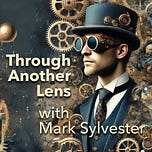Capturing the Moment
I'm on a quick trip to Colorado for my friend Duey Freeman's 75th birthday. He picked me up at the airport Saturday night, and now it's Sunday morning, over breakfast at my hotel in Golden.
.
Duey and I found ourselves talking about something neither of us had examined before. Two men in their seventies, trying to figure out why neither of us has had what we'd call a best friend since... well, maybe never.
"I have friends, of course," I told him. "Work friends. Coffee buddies. Professional associates. Family. Kymberlee, whom I say is my best friend because that's what married people say."
He nodded. "Same here. Kimberly" - we always laugh about this coincidence, our wives sharing essentially the same name. "She's my partner, my love, my closest companion. But this thing we have, Mark, it's different."
We started mapping it out, just as we would solve a puzzle. Most men, we realized, don't have best friends. We have buddies. We have guys we grab coffee with, work alongside, maybe even vacation with.
But that person you call when your world shifts? That person you can say anything to? That person who shows up not because they should, but because they can't imagine not showing up?
Most of us don't have that. And here's the strange part - we don't miss it.
A Glimmer
After breakfast, we drove up the hill to his home to see his horses. He lives essentially on the side of a mountain, in a place heated by a wood stove and filled with mementos that make it cozy and welcoming.
Standing there with his three horses, watching him in his element at the Gestalt Equine Institute of the Rockies, I thought about all the connections I'd had over the decades.
Deep work partnerships with guys like Larry Barels and Bill Kovacs at Wavefront, where we built something revolutionary together, went through marriages, divorces, children, the whole messy, beautiful arc of life.
The intense bonds forged in restaurant kitchens under pressure, where you develop an almost telepathic understanding with your line cooks.
The hundreds of people I'd met through my TED experiences, rich networks of brilliant minds, and shared purposes.
I wasn't walking around feeling lonely or incomplete. Those relationships were exactly what they were supposed to be. Meaningful. Important. Real.
But this thing with Duey? It's an entirely different category of human connection.
How It Actually Started
The friendship that grew between us is something I'd never experienced before. It started five years ago through a mutual friend, Traver Boehm, who founded the MAN UNCIVILIZED movement. Traver thought we'd get along well and suggested we talk. He had no idea what would grow from that simple introduction.
We talked for the first time the following Saturday morning. When Duey had to go, we decided to talk the next week. By the third week, after about five minutes, I asked for permission to hit the record button.
That was the beginning of The Elder Council, 150 episodes ago.
The things we talk about are things we didn't know when we were 20, 30, 40, 50, and what we'd like to tell our younger selves. We get comments from people who say we "model" what best friends look like.
That wasn't intentional, but it shows.
The Public Declaration
Later that afternoon, I found myself in a living room in Littleton, surrounded by about thirty people celebrating Duey's 75th birthday.
They'd set up a microphone, and one by one, people were stepping up to tell their stories to Duey. Stories of transformation. Stories of breakthrough moments. Stories of how this man helped them find something they didn't even know they'd lost.
It felt like a celebration of life where the person is still alive.
When it was my turn at the microphone, I looked out at this room full of people who clearly love this man, and I said something that surprised even me:
"I bet I'm the only one who can say Duey is my best friend."
At 72 years old, I have my first real best friend. And I just told a room full of people about it.
The conversation we'd had that morning over breakfast suddenly felt prophetic.
What Made the Difference
Here's what I discovered: the structure matters.
Having a regular reason to go deep - not just hoping it would happen casually - made all the difference. The podcast gave us permission to skip small talk and dive into what actually matters. It created a container for vulnerability that most male friendships never have.
With Duey, I can share anything - doubts about decisions I'm making, excitement about new projects, worries about family, even just random thoughts that pop up during the week. There's no judgment, no need to perform or impress. Just a real conversation between two people who genuinely care about each other's well-being.
We had a reason to be vulnerable regularly.
The Question That Haunts Me
After everyone had left that birthday celebration, and it was him and me, and Kimberly and the lovely people whose home we were in were cleaning up, we commented on how wonderful it was to have such a supportive community of friends.
And one best one.
Here's what I keep coming back to: Why didn't I miss this aspect of life?
I think it's because you can live a rich, connected life without a best friend. I had meaningful work partnerships, kitchen camaraderie, professional networks, family relationships, and a loving marriage. I wasn't broken, lonely, or incomplete.
But once you experience what deep, regular, vulnerable conversations create with another person, you realize it's an entirely different dimension of human connection.
Maybe that's why most men don't miss it. We're genuinely satisfied with our work, our bonds, our marriages, and our networks.
We don't know what we don't know.
What Men Actually Need
I wonder what would happen if more men had permission to build this. If we created more structures - regular calls, shared projects, intentional conversations - that allow friendship to deepen beyond the buddy level.
Maybe that's what men need. Not to be told we're doing friendship wrong, but to be given permission and structure to build something more profound than what we've settled for.
Because settling isn't a character flaw, it's just not knowing what else is possible.
At 72, I finally know what else is possible.
And it's been worth the wait.
Now, when I think about men who might be reading this, I wonder: what would it look like to create that structure in your own life? Maybe it's a monthly call with someone you respect. Perhaps it's starting a book club that addresses the big questions. Maybe it's just being brave enough to ask someone, "How are you really doing?" and then actually listening to the answer.
What structures in your life create space for deeper connection? I'd love to hear about the friendships that have surprised you, or the conversations that changed everything.
ps. Here’s the image I spoke about on the podcast - the left is Summer, and the right is Winter.

















Share this post